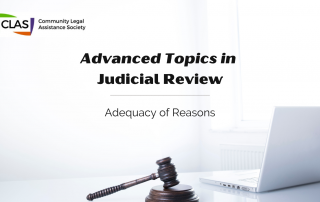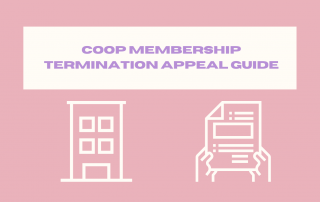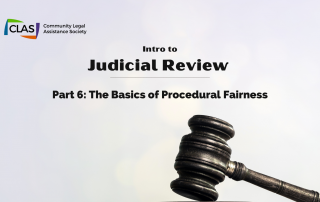Housing Law Reform
Access to safe and affordable housing is crucial for our well being. However, residents of British Columbia are facing a housing crisis – a crisis that fundamentally impacts low and fixed income people. Low vacancy rates and exorbitant rents mean that many people are housing insecure. Those who have housing cannot afford to have their rent increased or be evicted.
We want to strengthen the protections afforded to residential tenants and keep people in their homes. Our law reform work in housing is informed by our direct service work and years of expertise in residential tenancy law. We believe closing gaps and strengthening systems that are meant to protect low and modest income renters is crucial to alleviating the worst impacts of this crisis.
Currently we are working on two areas of housing law reform.
Eliminating the direct request process at the RTB
Pursuant to the Residential Tenancy Act, if a tenant has not paid rent or disputed the eviction notice for unpaid rent within a 5 day period, a landlord can apply to the Residential Tenancy Branch for a process called “direct request.” This is an expedited process that allows arbitrators to allow an eviction to proceed without hearing the tenant’s evidence. Arbitrators also consistently apply a low evidentiary standard in these proceedings and are often satisfied that landlords have met their evidentiary burden through unsworn, written testimony. As a result, tenants are denied the fair opportunity to be heard and challenge the landlord’s evidence on a matter as important as the loss of their housing.
Eliminating unfair evictions
When a tenancy is ending, the Residential Tenancy Act allows arbitrators to grant orders of possession, which can be used by landlords to evict tenants. In issuing these orders, most arbitrators default to issuing orders that require tenants to vacate the rental unit in two days’ time, which can quickly drive a person into homelessness or precarious housing. In many cases, there is minimal or no financial risk to the landlord if the tenant is able to remain in their home for a longer period of time. In these situations, fairness requires a true balancing of the potential hardship for both parties.
GZ v AS
The landlord provided the tenant with a 2 month notice to end the tenancy for landlord’s use of property for a family member moving into the unit. The tenant successfully disputed this notice with the RTB. A short time thereafter, the landlord provided the tenant with another notice to end tenancy for the same reason. However, the tenant was not successful in his dispute of this notice with the RTB and the RTB arbitrator upheld the Notice to end tenancy for landlord’s use. The tenant applied for judicial review with the BC Supreme Court. In the decision, Justice Davies set aside the RTB decision on the basis that the landlord was attempting to re-litigate an issue that had already been decided by the RTB.
Marshall v Pohl, 2019 BCSC 406
The landlord served the tenant with a 1 month notice to end tenancy for cause, which the RTB arbitrator upheld. The tenant applied for judicial review with the BC Supreme Court. In the decision, Justice Skolrood set aside the RTB decision on the basis that the RTB arbitrators reasons for the decision were inadequate.
Aarti Investments Ltd. v. Baumann, 2019 BCCA 165
The landlord provided a client with a 2 month notice for landlord’s use of property for renovations, which the RTB arbitrator upheld. The tenant applied for judicial review with the BC Supreme Court. In the decision, Justice Brundrett set the RTB decision aside on the basis that the arbitrator failed to consider relevant evidence presented by our client and whether the renovations required vacant possession, reversed the burden of proof for the requirement of good faith, and allowed the eviction to stand despite acknowledging that the landlord did not have all the necessary permits. However, the landlord disagreed with the BC Supreme Court decision and applied to the BC Court of Appeal. The BC Court of Appeal dismissed the landlord’s application and partially confirmed the BC Supreme Court decision.
M.B.B. v Affordable Housing Charitable Association, 2018 BCSC 2418
The landlord served the tenant with a 1 month notice to end tenancy for cause. For various reasons our client was not able to call into the RTB hearing. AS a result, the RTB arbitrator upheld the 1 month notice to end tenancy for cause on the basis that our client did not attend the RTB hearing. The tenant applied for judicial review with the BC Supreme Court. In the Decision, Justice Milman set aside the RTB decision on the basis that the RTB arbitrator did not consider whether the statutory requirements for ending a tenancy had been met.
Fernandez v. Sakr, 2012 BCSC 1024
CLAS successfully represented a tenant to challenge a monetary order issued against her after the Residential Tenancy Branch failed to ensure that her hearing met the most basic requirements of procedural fairness.
Barosso v. Frazer Plaza Ltd., 2011 BCSC 1448: CLAS successfully helped a group of tenants to overturn rent increases.
Clements v. Gordon Nelson Investments Inc., 2010 BCSC 31: CLAS helped a group of tenants to overturn a decision of the Residential Tenancy Branch allowing rent increases. This case clarifies the approach the Branch must take for determining whether a rent increase is permissible.
Doughty v. Whitworth Holdings Ltd., 2008 BCSC 801: CLAS represented a group of tenants facing illegal rent increases, successfully arguing that the Residential Tenancy Branch had failed to properly apply the Residential Tenancy Act.
Mochizuki v. Whitworth Holdings Ltd, 2008 BCSC 802
CLAS successfully represented a group of tenants facing illegal rent increases in this case which affirmed the Residential Tenancy Branch’s duty to give adequate reasons for its decisions.
Ross v. British Columbia (Residential Tenancy Act, Dispute Resolution Officer), 2008 BCSC 1862
CLAS successfully represented this tenant in a case affirming the Residential Tenancy Branch’s obligation to adhere to principles of procedural fairness.
Berry and Kloet v. British Columbia (Residential Tenancy Act, Arbitrator), 2007 BCSC 257: CLAS successfully represented two tenants in a case which sets out the applicable principles for when a landlord can evict a tenant in order to conduct renovations.
Reports & Submissions
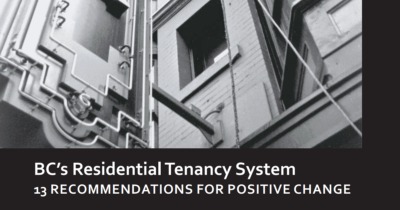
BC’s Residential Tenancy System: 13 Recommendations for Change
May 2013 – CLAS partnered with housing advocacy groups to present 13 recommendations for urgent changes to the Residential Tenancy Act, which would dramatically improve the lives of landlords and tenants in BC.

Rental Recommendations 2015: Reforming the BC Residential Tenancy System
2015 – CLAS lawyers worked with the City of Vancouver Renters Advisory Committee on this report, building on the longstanding work of other organizations in order to present recommendations for improving the residential tenancy system.
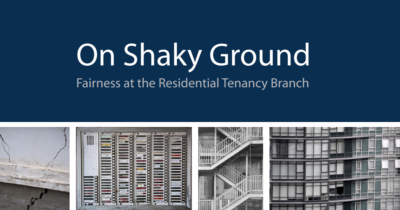
On Shaky Ground: Fairness at the Residential Tenancy Branch
October 2013 – In this comprehensive report, CLAS lawyers investigated the Residential Tenancy Branch’s performance in its key service areas: education, decision making and enforcement. The report reveals serious and troubling deficiencies in the Branch’s work, and makes urgent recommendations for critical changes to the system that is responsible for upholding the rights of tenants and landlords throughout the province.
Housing & Evictions News
Residential Tenancy Law Update
By Jonathan Blair, Lawyer, Community Law Program
As the affordability crisis […]
Advanced Topics in Judicial Review: Adequacy of Reasons
In this series, we build on the foundations of our […]
Advanced Topics in Judicial Review: Adequacy of Reasons
In this series, we build on the foundations of our […]
Coop Membership Termination Appeal Guide
By Holly Popenia, Community Law Program Lawyer
Coop housing can be […]
Intro to JR: The Basics of Procedural Fairness
In Part 6 of our “Intro to Judicial Review” blog […]
Non-Profit Housing and the Residential Tenancy Act
By Emily Zarychta, Articling Student
The Residential Tenancy Act (the […]


